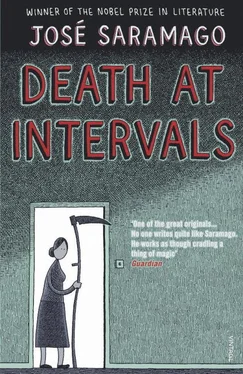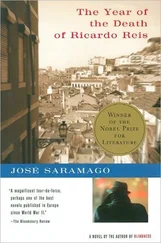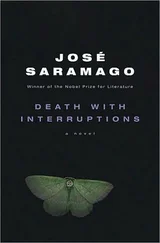A terrible threat is endangering the survival of our industry, declared the president of the federation of insurance companies to the media, referring to the many thousands of letters which, all couched in more or less identical terms, as if they had been copied from a single draft, had, in the last few days, been flooding their offices, all calling for the immediate cancellation of the life insurance policies of the undersigned. These letters stated that, given the well-known fact that death had put an end to itself, it would be absurd, not to say downright stupid, to continue paying exorbitant premiums which would only serve to make the companies still richer, with no kind of balancing recompense for them. I’m not pouring money down the drain, said one particularly disgruntled policy-holder in a postscript. Some went further, demanding the return of sums already paid, but in these cases, it was clear that they were just making a stab in the dark, trying their luck. In answer to the inevitable question from journalists about how the insurance companies intended to fend off this sudden salvo of heavy artillery, the president of the federation said that, while their legal advisors were, at that very moment, carefully studying the small print of policies for some kind of interpretative loophole that would allow them, always keeping strictly to the letter of the law, of course, to impose on these heretical policy-holders, even if it were against their wishes, the obligation to continue paying premiums for as long as they remained alive, that is, for all eternity, the more likely option would be to reach some form of consensus, a gentlemen’s agreement, which would consist in the addition to policies of a brief addendum, with one eye on rectifying the current situation and with the other on the future, and which would set eighty as the age of obligatory death, in a purely figurative sense of course, the president was quick to add, smiling benevolently. In this way, the companies would receive the premiums, as normal, until the date when the happy policy-holder celebrated his eightieth birthday, at which time, now that he had become someone who was, virtually speaking, dead, he would promptly be paid the full sum stipulated in the policy. He should also add, and this would be of no small interest, that, if they so desired, customers could renew their contract for another eighty years, at the end of which, they would, to all intents and purposes, register a second death, and the earlier procedure would then be repeated, and so on and so forth. Amongst the journalists who knew their actuarial calculus, there were some admiring murmurs and a brief flutter of applause which the president acknowledged with a brief nod. Strategically and tactically, the move had been perfect, so much so that the following day letters started pouring in again to the insurance companies declaring the previous letters null and void. All the policy-holders declared themselves ready to accept the proposed gentleman’s agreement, and indeed one might say, without exaggeration, that this was one of those very rare occasions when no one lost and everyone gained. Especially the insurance companies, which had been saved from catastrophe by the skin of their teeth. It is assumed that at the next election, the president of the federation will be re-elected to the post he fills so very brilliantly.
ONE CAN SAY almost anything about the first meeting of the interdisciplinary commission except that it went well. The blame, if such a weighty term can be applied here, rests on the dramatic memorandum sent to the government by the eventide homes, especially those final ominous words, Rather death, prime minister, than such a destiny. The philosophers, divided as always between frowning pessimists and smiling optimists, readied themselves to recommence for the thousandth time the ancient dispute over whether the glass was half full or half empty, a dispute which, when transferred to the matter they had been summoned there to discuss, would probably come down to a mere inventory of the advantages and disadvantages of being dead or of living for ever, while the religious delegates, from the outset, presented a united front, hoping to set the debate on the only dialectical terrain that interested them, that is, the explicit acceptance that death was fundamental to the existence of the kingdom of god and that, therefore, any discussion about a future without death would be not only blasphemous but absurd, since it would, inevitably, presuppose an absent or, rather, vanished god. This was not a new attitude, the cardinal himself had already put his finger on the implications of this theological version of squaring the circle, when, in his phone conversation with the prime minister, he admitted, although not in so many words, that if there was no death, there could be no resurrection, and if there was no resurrection, then there would be no point in having a church. Now, since this was clearly the only agricultural implement god possessed with which to plough the roads that would lead to his kingdom, the obvious, irrefutable conclusion is that the entire holy story ends, inevitably, in a cul-de-sac. This bitter argument came from the mouth of the oldest of the pessimistic philosophers, who did not stop there, but went on, Whether we like it or not, the one justification for the existence of all religions is death, they need death as much as we need bread to eat. The religious delegates did not bother to protest. On the contrary, one of them, a highly regarded member of the catholic sector, said, You’re absolutely right, my dear philosopher, that, of course, is why we exist, so that people will spend their entire life with fear hanging round their neck, and when their time comes, they will then welcome death as a liberation, You mean paradise, Paradise or hell, or nothing at all, what happens after death matters to us far less than is generally believed, religion, sir, is an earthly matter, and has nothing to do with heaven, That isn’t what we’re usually told, We had to say something to make the merchandise attractive, So does that mean you don’t believe in eternal life, We pretend we do. For a minute no one spoke. The oldest of the pessimists allowed a wry smile to spread across his face and he adopted the air of someone who has just seen a particularly difficult laboratory experiment crowned with success. In that case, said a philosopher from the optimistic wing, why are you so alarmed by the fact that death has ended, We don’t know that it has, we know only that it has ceased to kill, which is not the same thing, Agreed, but given that this doubt remains unresolved, I repeat my question, Because if human beings do not die then everything will be permissible, And would that be a bad thing, asked the old philosopher, As bad as nothing being permissible. There was another silence. The eight men seated round the table had been asked to reflect upon the consequences of a future without death and to construct from the present information a plausible forecast of what new problems a society would have to confront, quite apart, of course, from an inevitable exacerbation of the old problems. The trouble is that the future is already here, said one of the pessimists, before us we have, amongst others, statements drawn up by the so-called eventide homes, by hospitals, by funeral directors, by insurance companies, and apart from the latter, who will always find a way of profiting from any situation, one must admit that the prospects are not just gloomy, they’re terrible, catastrophic, more dangerous by far than anything even the wildest imagination could dream up, Without wishing to be ironic, which, in the current circumstances, would be in appalling taste, remarked an equally highly regarded member of the protestant sector, it seems to me that this commission is dead before it’s been born, The eventide homes are right, rather death than such a destiny, said the catholic spokesman, What do you propose we do then, asked the oldest of the pessimists, apart from the immediate dissolution of this commission, which is what you appear to want, We, the catholic apostolic roman church, will organise a national campaign of prayer, asking god to bring about the return of death as quickly as possible so as to save poor humanity from the worst horrors, Does god have authority over death, asked one of the optimists, They’re two sides of the same coin, on one side the king and on the other the crown, In that case perhaps it was god who ordered death to withdraw, One day we will know why he set us this test, meanwhile we will put our rosaries to work, We will do the same, by which I mean that we, too, will pray, no rosaries for us, of course, smiled the protestant, And we will arrange processions throughout the country calling on death to return, just as we used to do ad petendam pluviam, to ask for rain, translated the catholic, We won’t go that far, such processions have never been part of our customs, said the protestant, smiling again, And what about us, asked one of the optimistic philosophers in a tone that seemed to announce his imminent enlistment in the ranks of the opposition, what are we going to do now, when it seems that all doors are closed to us, To start with, replied the oldest philosopher, let’s adjourn this session, And then what, We will continue to philosophise since that is what we were born to do, even if all we have to philosophise about is the void, What for, I don’t know what for, All right, then, why, Because philosophy needs death as much as religions do, if we philosophise it’s in order to know that we will die, as monsieur de montaigne said, to philosophise is to learn how to die.
Читать дальше












